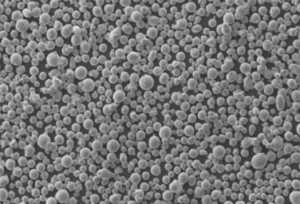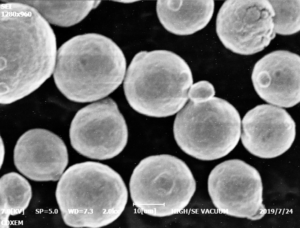When it comes to producing high-quality metal powders, a gas atomizer manufacturer plays a crucial role. In this in-depth guide, we’ll dive into the world of gas atomizers, exploring their importance, the specific metal powder models they produce, and much more. Whether you’re a seasoned professional or just getting started, this article is designed to provide you with all the information you need.
Overview of Gas Atomizer Manufacturers
Gas atomizers are sophisticated devices used in the production of fine metal powders. These powders are critical in various industries, including aerospace, automotive, medical, and additive manufacturing. The primary function of a gas atomizer is to convert molten metal into fine, spherical powder particles by atomizing the molten stream with a high-pressure gas.
Key Details
- Purpose: Production of fine metal powders
- Industries: Aerospace, automotive, medical, additive manufacturing
- Process: Atomization of molten metal using high-pressure gas
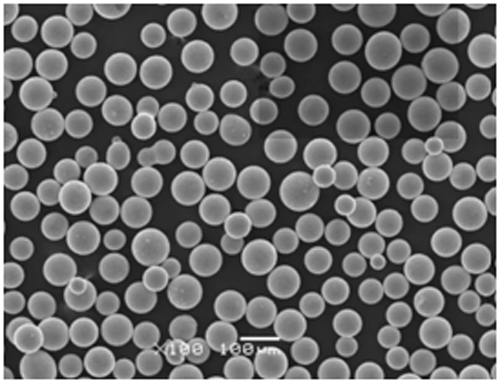
Types and Models of Metal Powders
Gas atomizers produce a wide range of metal powders, each with unique properties and applications. Here are some specific metal powder models you should know about:
List of Specific Metal Powder Models
- 316L Stainless Steel Powder
- Description: High corrosion resistance, excellent mechanical properties
- Applications: Medical implants, aerospace components
- 17-4 PH Stainless Steel Powder
- Description: Precipitation-hardened, high strength and hardness
- Applications: Aerospace, automotive, surgical instruments
- Inconel 718 Powder
- Description: Nickel-based superalloy, excellent high-temperature performance
- Applications: Jet engines, gas turbines, space vehicles
- Titanium Ti-6Al-4V Powder
- Description: High strength-to-weight ratio, biocompatibility
- Applications: Medical implants, aerospace, military
- Cobalt-Chrome Powder
- Description: High wear resistance, excellent corrosion resistance
- Applications: Dental implants, aerospace, medical devices
- Aluminum AlSi10Mg Powder
- Description: Lightweight, good thermal properties
- Applications: Automotive parts, aerospace, electronics
- Copper CuCrZr Powder
- Description: High electrical and thermal conductivity
- Applications: Electrical components, thermal management systems
- Nickel 625 Powder
- Description: High corrosion and oxidation resistance, good weldability
- Applications: Chemical processing, marine, aerospace
- Tool Steel M2 Powder
- Description: High hardness, excellent wear resistance
- Applications: Cutting tools, molds, dies
- Bronze 90/10 Powder
- Description: Good machinability, corrosion resistance
- Applications: Bearings, bushings, gears
Composition and Characteristics of Gas Atomizer Metal Powders
Understanding the composition and characteristics of metal powders is essential for selecting the right material for your application. Here’s a breakdown:
| Metal Powder | Composition | Characteristics |
|---|---|---|
| 316L Stainless Steel | Fe, Cr, Ni, Mo | Corrosion resistance, mechanical strength |
| 17-4 PH Stainless Steel | Fe, Cr, Ni, Cu, Nb | High strength, hardness |
| Inconel 718 | Ni, Cr, Fe, Nb, Mo, Ti, Al | High-temperature performance, oxidation resistance |
| Titanium Ti-6Al-4V | Ti, Al, V | Strength-to-weight ratio, biocompatibility |
| Cobalt-Chrome | Co, Cr, Mo | Wear resistance, corrosion resistance |
| Aluminum AlSi10Mg | Al, Si, Mg | Lightweight, thermal conductivity |
| Copper CuCrZr | Cu, Cr, Zr | Electrical and thermal conductivity |
| Nickel 625 | Ni, Cr, Mo, Nb | Corrosion resistance, weldability |
| Tool Steel M2 | Fe, C, Mo, W, Cr, V | Hardness, wear resistance |
| Bronze 90/10 | Cu, Sn | Machinability, corrosion resistance |
Applications of Metal Powders Produced by Gas Atomizers
Metal powders have diverse applications across various industries. Here’s how different powders are used:
| Industry | Metal Powder | Applications |
|---|---|---|
| Aerospace | Inconel 718, Titanium Ti-6Al-4V | Jet engines, structural components |
| Automotive | Aluminum AlSi10Mg, 17-4 PH Stainless Steel | Engine parts, structural components |
| Medical | 316L Stainless Steel, Titanium Ti-6Al-4V | Implants, surgical instruments |
| Additive Manufacturing | Various (e.g., Tool Steel M2, Inconel 718) | Prototyping, custom parts |
| Electrical | Copper CuCrZr | Conductive components, heat exchangers |
| Chemical Processing | Nickel 625, Inconel 718 | Corrosion-resistant parts, reactors |
| Marine | Nickel 625, Bronze 90/10 | Corrosion-resistant fittings, propellers |
| Dental | Cobalt-Chrome | Dental implants, prosthetics |

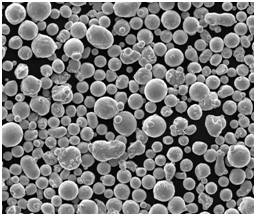
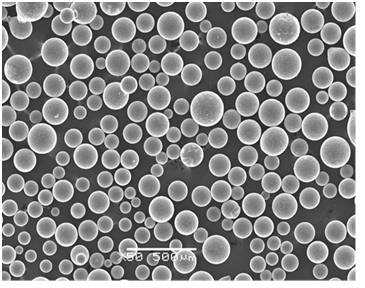
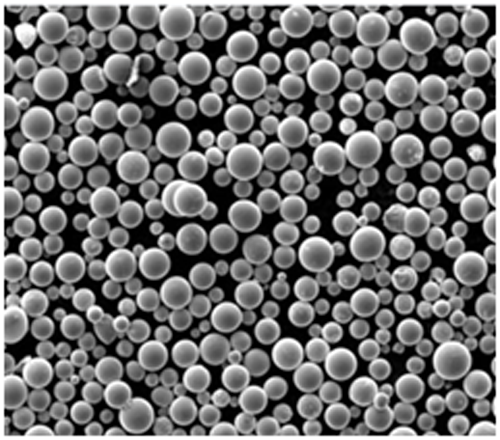


Specifications, Sizes, Grades, and Standards of Metal Powders
Different applications require metal powders to meet specific standards and specifications. Here’s a detailed look at the various parameters:
| Metal Powder | Specifications | Sizes | Grades | Standards |
|---|---|---|---|---|
| 316L Stainless Steel | ASTM A240, ISO 5832-1 | -45/+15 µm | 316L-1, 316L-2 | ASTM, ISO |
| 17-4 PH Stainless Steel | ASTM A693 | -53/+20 µm | 17-4 PH-1, 17-4 PH-2 | ASTM, ISO |
| Inconel 718 | AMS 5662, ASTM B637 | -63/+25 µm | 718-1, 718-2 | AMS, ASTM |
| Titanium Ti-6Al-4V | ASTM F136, AMS 4911 | -45/+15 µm | Ti-6Al-4V-1, Ti-6Al-4V-2 | ASTM, AMS |
| Cobalt-Chrome | ASTM F75, ISO 5832-4 | -63/+25 µm | CoCr-1, CoCr-2 | ASTM, ISO |
| Aluminum AlSi10Mg | ASTM B209, DIN EN 1706 | -45/+15 µm | AlSi10Mg-1, AlSi10Mg-2 | ASTM, DIN |
| Copper CuCrZr | ASTM B224, UNS C18150 | -53/+20 µm | CuCrZr-1, CuCrZr-2 | ASTM, UNS |
| Nickel 625 | AMS 5666, ASTM B446 | -63/+25 µm | 625-1, 625-2 | AMS, ASTM |
| Tool Steel M2 | ASTM A600, UNS T11302 | -53/+20 µm | M2-1, M2-2 | ASTM, UNS |
| Bronze 90/10 | ASTM B505, UNS C93700 | -45/+15 µm | 90/10-1, 90/10-2 | ASTM, UNS |
Suppliers and Pricing Details
Finding the right supplier for metal powders is critical for quality and cost efficiency. Here’s a list of some leading suppliers along with pricing details:
| Supplier | Metal Powder | Price Range (per kg) | Region |
|---|---|---|---|
| GKN Hoeganaes | 316L Stainless Steel | $50 – $70 | North America |
| Sandvik | Titanium Ti-6Al-4V | $200 – $300 | Europe |
| Höganäs | Inconel 718 | $80 – $120 | Global |
| Carpenter Technology | 17-4 PH Stainless Steel | $60 – $90 | North America |
| Kennametal | Cobalt-Chrome | $150 – $250 | North America |
| LPW Technology | Aluminum AlSi10Mg | $30 – $50 | Europe, North America |
| Oerlikon Metco | Copper CuCrZr | $70 – $100 | Global |
| Tekna | Nickel 625 | $90 – $130 | Global |
| Arcam AB | Tool Steel M2 | $40 – $60 | Europe |
| EOS GmbH | Bronze 90/10 | $25 – $40 | Europe |
Pros and Cons of Different Metal Powders
When choosing a metal powder, it’s essential to weigh the pros and cons. Here’s a comparison to help you make an informed decision:
| Metal Powder | Advantages | Limitations |
|---|---|---|
| 316L Stainless Steel | High corrosion resistance, biocompatible | Higher cost compared to standard stainless steel |
| 17-4 PH Stainless Steel | High strength, good hardness | Limited to specific applications |
| Inconel 718 | Excellent high-temperature performance, oxidation resistance | Expensive, difficult to machine |
| Titanium Ti-6Al-4V | High strength-to-weight ratio, biocompatible | High cost, difficult to process |
| Cobalt-Chrome | High wear and corrosion resistance | Expensive, limited to specialized applications |
| Aluminum AlSi10Mg | Lightweight, good thermal properties | Lower strength compared to other alloys |
| Copper CuCrZr | Excellent electrical and thermal conductivity | Expensive, prone to oxidation |
| Nickel 625 | High corrosion and oxidation resistance | High cost |
| Tool Steel M2 | High hardness, wear resistance | Brittle, difficult to machine |
| Bronze 90/10 | Good machinability, corrosion resistance | Lower strength compared to steel alloys |

FAQ
Here are some frequently asked questions about gas atomizer manufacturers and their metal powders:
| Question | Answer |
|---|---|
| What is a gas atomizer? | A gas atomizer is a device used to produce fine metal powders by atomizing molten metal with high-pressure gas. |
| Why are metal powders important? | Metal powders are essential for various industries like aerospace, automotive, and medical because of their unique properties and applications. |
| What are the common metal powders produced? | Common metal powders include stainless steel, titanium, nickel alloys, cobalt-chrome, aluminum, and copper alloys. |
| How do I choose the right metal powder? | The choice depends on the specific requirements of your application, such as strength, corrosion resistance, biocompatibility, and thermal properties. |
| What standards do metal powders need to meet? | Metal powders must meet industry standards such as ASTM, ISO, AMS, and UNS to ensure quality and compatibility with various applications. |
| Where can I buy metal powders? | Metal powders can be purchased from suppliers like GKN Hoeganaes, Sandvik, Höganäs, Carpenter Technology, Kennametal, and many others worldwide. |
| What are the price ranges for metal powders? | Prices vary depending on the type of metal powder, with stainless steel powders ranging from $50 to $70 per kg and titanium powders ranging from $200 to $300 per kg. |
Conclusion
Gas atomizer manufacturers play a pivotal role in producing high-quality metal powders crucial for various high-tech applications. By understanding the different types of metal powders, their properties, and applications, you can make informed decisions for your specific needs. Whether you’re looking to enhance your manufacturing process or innovate in a new field, the right metal powder can make all the difference.
